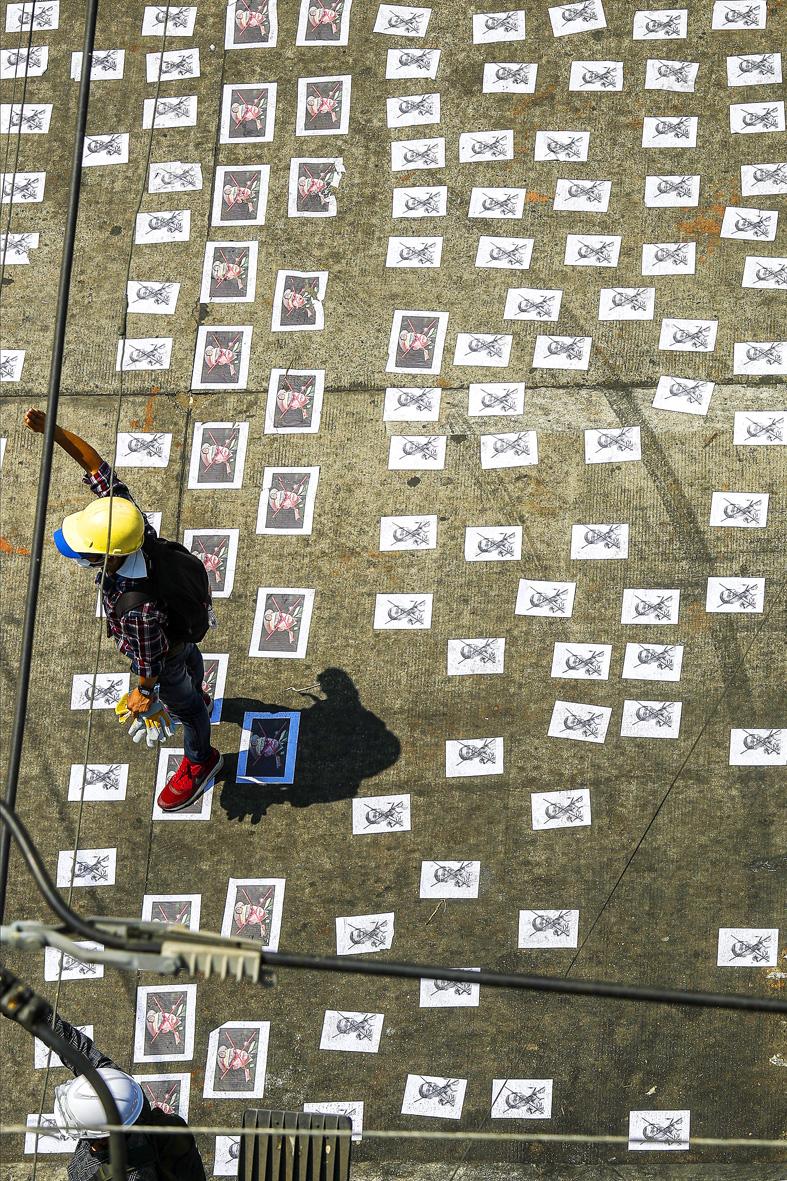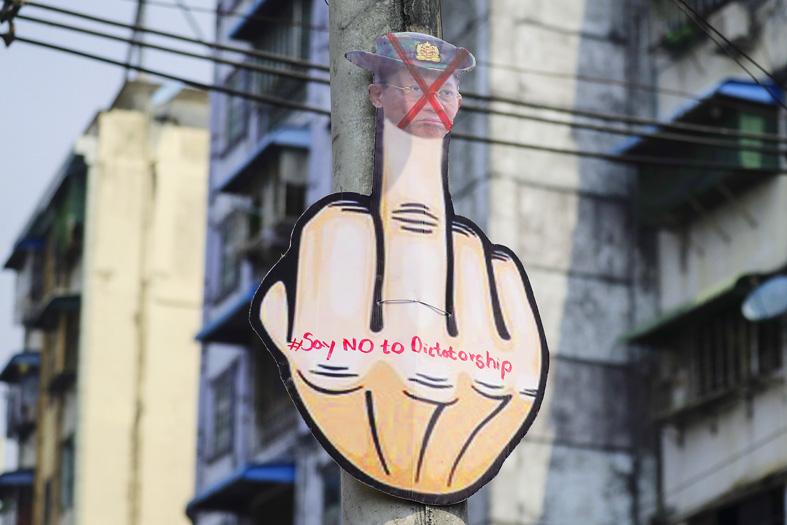As the US looks to build a coalition to further punish Myanmar’s generals, it is not having much success convincing governments in Asia to follow suit.
The standing of Burmese Army Senior General Min Aung Hlaing’s regime has slipped even further in the West after his envoy to the UN denounced the military takeover and Burmese authorities killed 18 protesters on Sunday, the deadliest day since the Feb. 1 coup.
While the junta has since told security forces to avoid using live bullets, reports emerged yesterday that protesters were still being shot with them.

Photo: EPA-EFE
Washington has led the global pushback, with US National Security Adviser Jake Sullivan saying the US was “coordinating closely with allies and partners in the Indo-Pacific region” and would take additional actions after imposing targeted sanctions on the coup makers.
The UK also sanctioned the generals and the EU has said it is working on punitive measures.
Asian nations, by contrast, have not taken any concrete action.

Photo: EPA-EFE
While Indonesia has conducted shuttle diplomacy and Singapore has said its “appalled by the violence,” no countries in the region have so far indicated they would support sanctions or any other measures that would hit the military’s finances.
Foreign ministers of the 10-member ASEAN, which includes Myanmar, sought to balance calls for the release of Aung San Suu Kyi, while also avoiding any interference in its internal affairs.
Singaporean Prime Minister Lee Hsien Loong (李顯龍) said sanctions would only hurt the population at large and push Myanmar closer to those willing to talk to them like China.
“You can ostracize them, condemn them, and pass resolutions or not, but it really has very little influence,” Lee told the BBC, according to comments distributed by his office. “We have to express disapproval for what is done, which is against the values of many other countries, and in fact a large part of humanity. But to say that I will take action against them, where does this lead?”
For Myanmar’s generals, Asia’s reluctance to join US-led sanctions or even cut them out of meetings effectively offers a diplomatic lifeline as they struggle to gain control of the country.
Prior to Myanmar’s opening about a decade ago, business ties with Asia allowed the junta to survive for years, despite much broader Western sanctions than are currently in place.
“ASEAN has an unmatched track record of indifference to authoritarian rule in Myanmar,” said Lee Morgenbesser, a lecturer at Australia’s Griffith University who researches Southeast Asian politics.
Countries in Asia also avoided sanctioning Burmese generals over allegations of genocide against the Muslim Rohingya minority that forced more than 700,000 people to flee to Bangladesh.
An independent UN fact-finding mission found in 2019 that at least 59 foreign firms — most from Asia — had either joint ventures or commercial ties with the military, producing revenue that “substantially enhances its ability to carry out gross violations of human rights with impunity.”
“In some ways, ASEAN allowed the military to get away with what happened with the Rohingya crisis and I think that they are faced with something more dangerous,” said Bridget Welsh, honorary research associate at the Asia Research Institute, University of Nottingham Malaysia. “This is going to be much more difficult for them to wrestle with.”

NO HUMAN ERROR: After the incident, the Coast Guard Administration said it would obtain uncrewed aerial vehicles and vessels to boost its detection capacity Authorities would improve border control to prevent unlawful entry into Taiwan’s waters and safeguard national security, the Mainland Affairs Council (MAC) said yesterday after a Chinese man reached the nation’s coast on an inflatable boat, saying he “defected to freedom.” The man was found on a rubber boat when he was about to set foot on Taiwan at the estuary of Houkeng River (後坑溪) near Taiping Borough (太平) in New Taipei City’s Linkou District (林口), authorities said. The Coast Guard Administration’s (CGA) northern branch said it received a report at 6:30am yesterday morning from the New Taipei City Fire Department about a

IN BEIJING’S FAVOR: A China Coast Guard spokesperson said that the Chinese maritime police would continue to carry out law enforcement activities in waters it claims The Philippines withdrew its coast guard vessel from a South China Sea shoal that has recently been at the center of tensions with Beijing. BRP Teresa Magbanua “was compelled to return to port” from Sabina Shoal (Xianbin Shoal, 仙濱暗沙) due to bad weather, depleted supplies and the need to evacuate personnel requiring medical care, the Philippine Coast Guard (PCG) spokesman Jay Tarriela said yesterday in a post on X. The Philippine vessel “will be in tiptop shape to resume her mission” after it has been resupplied and repaired, Philippine Executive Secretary Lucas Bersamin, who heads the nation’s maritime council, said

REGIONAL STABILITY: Taipei thanked the Biden administration for authorizing its 16th sale of military goods and services to uphold Taiwan’s defense and safety The US Department of State has approved the sale of US$228 million of military goods and services to Taiwan, the US Department of Defense said on Monday. The state department “made a determination approving a possible Foreign Military Sale” to the Taipei Economic and Cultural Representative Office in the US for “return, repair and reshipment of spare parts and related equipment,” the defense department’s Defense Security Cooperation Agency said in a news release. Taiwan had requested the purchase of items and services which include the “return, repair and reshipment of classified and unclassified spare parts for aircraft and related equipment; US Government

More than 500 people on Saturday marched in New York in support of Taiwan’s entry to the UN, significantly more people than previous years. The march, coinciding with the ongoing 79th session of the UN General Assembly, comes close on the heels of growing international discourse regarding the meaning of UN Resolution 2758. Resolution 2758, adopted by the UN General Assembly in 1971, recognizes the People’s Republic of China (PRC) as the “only lawful representative of China.” It resulted in the Republic of China (ROC) losing its seat at the UN to the PRC. Taiwan has since been excluded from